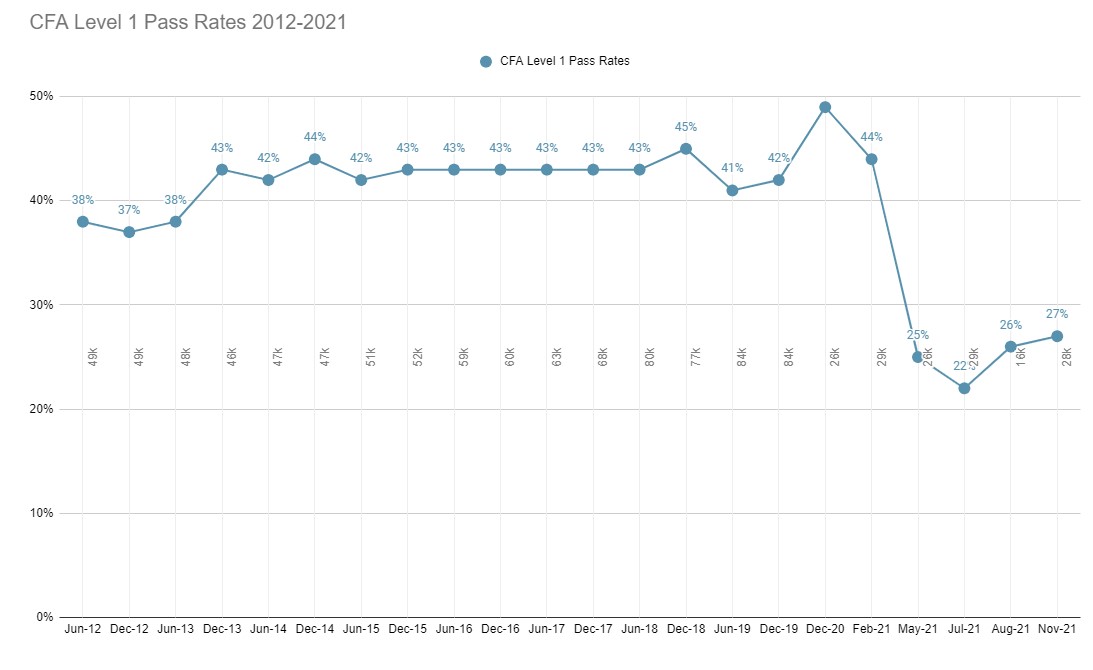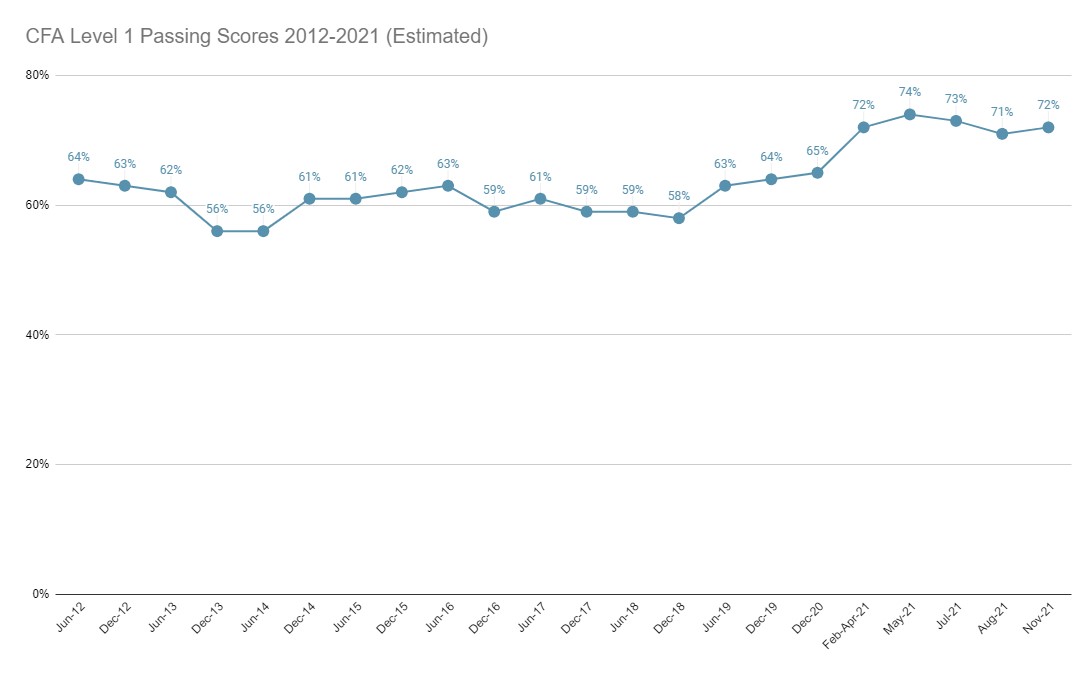The CFA exam is a challenging three-level exam, which contributes to its low success rate. The percentage of candidates that pass all levels is low when you take into account that the CFA level 1 pass rate is less than 50%. Let’s examine the data and talk about how you might raise your chances of passing.
To succeed on your first try and receive a good score, don’t forget to take our free CFA Level 1 practice test.
CFA Level 1 pass rates 2012-2022

The popularity of the CFA test may be seen in this chart, which shows that Level 1 candidate growth has been consistently increasing since 2015. Since the pandemic, yearly candidate volumes have dropped by around 60% compared to prior years.
For paper-based exams, CFA Level 1 pass rates have been generally consistent and over 40% since 2014. The increase in Level 1 pass rate to 49% on the last December 20 exam is most likely due to the extra time candidates have due to several COVID-19 exam postponements.
Unfortunately, owing to the ongoing pandemic situation, few candidates were able to appear for the exam even on December 20, and this is reflected on February 21’s data as well.
In May of this year, however, CFA Level 1 pass rates dropped — since 2010, CFA Level 1 pass rates have ranged from 36% to 49%, with an average of 42%. This decreased to 25% in the May 21 exam, then to 22% on July 21, before rising to 26% on August 21.
According to the CFA Institute’s official advice, the minimum passing score reflects the score that a ‘just competent’ candidate may earn, and it is expected to be consistent throughout the years, whether it is 2010, 2015, or 2020. If this is correct, the average CFA Level 1 candidate quality in May and July of this year was much lower than in previous exams.
When we initially saw it, we assumed it was a mistake. Unfortunately, the CFA Institute confirmed that the pass rate was 25% and that no error had been made. Many candidates have encountered the stop-start nature of preparation as a result of their exam postponements, according to CFA Institute.
However, the 22% pass rate on the level 1 CFA exam in July 2022 was much lower compared to CFA level 1 historical pass rates. It was, in fact, the lowest in recorded history! Now, the level 1 CFA test pass rate of 27% in November 2022 isn’t much better…
We believe one possible explanation is that there were many fewer no-shows than usual for the May, July, August, and November exams, affecting the 2022 pass rates. Why are there fewer no-shows? For starters, several exams were postponed in 2020 and early 2022 due to the pandemic. When the exam day arrived, candidates had waited far too long for their CFA exams and chose to stay at home. Second, starting in 2022, the CFA Institute will use a new CBT format. Candidates just went to their first CBT CFA tests to see how the new CFA exam experience appears now that the exams have been moved to computers.
According to data previously released by CFA Institute, in the past, up to 25% of registered candidates chose to stay at home rather than take the exam because they did not feel prepared. This suggests that the real pass rate used to be closer to 30% than the official average pass rate for level 1, which was 43% for a long time. However, we feel it is quite likely that, as a result of the several postponements and changes made to the CFA exam, more candidates are now willing to take a chance, despite the fact that they are aware that it is a difficult decision.
However, the most recent CFA pass rate for 2022 is extremely low, and we believe that our theory cannot adequately explain the situation.
For a long time, CFA Institute has been unable to offer us any form of analysis as to why the pass rates are so low. It was been reported that the low pass rates are due to the artificially longer preparation caused by CFA exam postponements in the wake of the pandemic.
On the contrary, others argue that the bar for the 2022 CFA exams was set excessively high.
According to the CFA Institute, the low pass rate is due to pandemic disruption and is just temporary:
So long as pandemic conditions subside, we predict the pass rate to return to pre-COVID historical levels in the future.
We must acknowledge that, based on what we’ve heard from CFA candidates, the MPS for the previous four 2022 level 1 CFA exams must have exceeded 70%. That is why so many of you failed by a hair’s breadth or passed by the skin of your teeth. Of course, the MPS, which is set separately for each exam, is never released by CFA Institute. So, we’re only guessing, but we’ve seen some recent results that seem to back up our informed guess.
A low passing score owing to pandemic disruption doesn’t explain why our MPS estimates have been rising – that is, of course, provided our MPS estimates accurately reflect what’s going on!
2022 Level 1 CFA exam pass rate will be higher?
Hopefully, when the first 2022 CFA exams take place, this thing that CFA Institute is doing with level 1 CFA exams (whatever it is that they will never admit and for whatever reason) will change. The great majority of CFA candidates in 2022 did not have to reschedule their exams. If the stop-start pattern of studying is to blame for the poor pass rates in 2022, the new CFA exam pass rates in 2022 should soar!
We’re crossing our fingers that this hopeful desire comes true.
CFA Level 1 passing score 2022 (estimated)

Note: Individual exams’ difficulty may vary somewhat since the introduction of computer-based testing (CBT). As a result, CFA Institute increases the minimum passing score by a few points to compensate. Therefore, your MPS may vary from our (aggregate) estimate.
From 2012 to 2022, we calculated that the CFA level 1 pass rate 2022 varied from 56% to 74%, with a 10-year average of 64%. The following are the most recent MPS for CFA Level 1:
- November 2022: 72%
- August 2022: 71%
- July 2022: 73%
- May 2022: 74%
- February 2022, March 2022, April 2022: 72%
Since the introduction of computer-based testing (CBT), we estimate that MPS have consistently exceeded 70% (CFA level 1 pass rate 70).
According to the CFA Institute’s official guidance, the minimum passing score reflects the score that a ‘just competent’ candidate may earn, and it is expected to be consistent throughout years, whether it is 2010, 2015, or 2020. If the MPS has truly increased to 70% or above, this indicates that the CBT exam format is easier to pass than the prior paper-based format.
Candidates used to be advised to strive for a 70% score on their mock tests. We no longer believe this is the case, based on the most recent MPS estimates. According to the most current MPS for 2022, 75% and above would be a lot safer bet.
We found that the MPS, 90th percentile, 10th percentile, and topic weightings for the March and April 2022 CFA exams were the same as for the February 2022 exams when we conducted the MPS analysis, therefore we’ve combined them into one exam. This implies:
- The same exam or the same topic percentage mix, or the same pool of questions, were used on February 21, March 21, and April 21.
- The MPS, 90th percentile, and 10th percentile were determined using the same candidate cohort on February 21, March 21, and April 21. It’s likely that March 21 and April 21 simply used the pool from February 21, which should be acceptable statistically because February 21 had many more candidates.
The CFA Institute Board of Governors sets the minimum passing score (MPS) for each level after each exam administration. The goal of this method is to guarantee that candidates are treated equally throughout administrations, as the difficulty of each exam is considered when determining the MPS. The MPS or individual candidate scores are not made public by the CFA Institute.
Exam results are available for about a year after the date of the test. After this date, candidates can generate and download a verification letter from their Account Profile’s Verification Letter section to establish their status with the CFA Program. A “pass” or “fail” exam result will be confirmed in the verification letter, but the topic area performance report will not be published.
How to increase your CFA exam pass rate?
For each level, you should plan on spending at least 300 hours studying. These tips will assist you in gaining the knowledge and confidence you’ll need to increase your odds of passing the CFA level 1 exam:
- Set a CFA study plan and get started studying as soon as possible.
- Concentrate on the CFA Institute’s Learning Outcome Statements (LOS), which explain exactly what you should complete on test day.
- Enroll in a CFA exam preparation course.
- Establish a steady and regular study schedule.
- To allow concepts (and their application) to percolate, divide your studying time between reading and practicing with breaks in between.
FAQs – CFA level 1 pass rate

Is Passing CFA Level 1 hard?
So is it hard to pass the CFA exam? Is CFA worth it? CFA exams are difficult, and Level 1 is only the beginning. CFA Level 1 is similar to a diploma level and grows harder from that. It is widely regarded as one of the world’s most challenging tests. But I had no idea it had never been done before, and by the way, you might surely fail.
Can you pass CFA level 1 with 50?
Financial Reporting and Analysis must be below 50%, Economics and Portfolio Management must be over 70%, and everything else (seven other subjects) must be between 51 and 70% to pass. 3. Even if you only obtain 49 percent in ethics and 50% in financial reporting and analysis, you can pass level 1.
Why is the CFA Level 1 pass rate so low?
COVID-19 has caused several professional exams to be canceled, causing enrollment to be delayed for many months. CFA candidates, unlike other professional test candidates, have been inconvenienced since the CFA Institute announced the cancellation of the June 2020 exams in March 2020.
Is CFA prestigious?
The CFA Is the most prestigious financial and investment designation. First and foremost, if your objective is to invest professionally, you are already aware of the CFA Institute (CFAI) and its charterholders’ reputation.
Is CFA Level 1 useful?
If you pass the CFA Level I exam, the job roles most likely available to you are intern, assistant accounting manager or accountant, fund analyst, investment administrator, investment product analyst, and junior equity research analyst (that is often the first step toward getting into asset management as a career).
How many times can you take the CFA?
Candidates may take the exam up to two times per calendar year (where applicable), but not in consecutive windows or in windows that are less than six months apart. Candidates will be allowed a maximum of six attempts per exam level.
What happens if I fail CFA?
If you don’t pass the CFA Test, look over the exam results and performance summary that were supplied with your score. Applicants should rethink their study plan and think about signing up for a CFA prep course. You’ll need a strategic test-taking approach that takes into account the exam’s format in addition to a strategic study plan.
We hope the preceding data was helpful to you and that it will provide you with additional important details regarding the CFA level 1 pass rate as well as some advice that will increase your chances of passing the test with flying colors.

PCCN vs CCRN: Which Certification Should I Take?
In this discussion, we will examine the fundamental distinctions between PCCN vs CCRN certifications, allowing you to make an informed and right decision about which certification is best for your nursing career progression.
June 20, 2023

Is PCCN Worth It? A Comprehensive 2025 Study Guide
In this article, we will provide all the enrollment criteria, how to apply, whether is PCCN worth it for you to obtain, and how to get a high mark.
June 20, 2023

PCCN Requirements - How to Become a Progressive Care Certified Nurse?
To become a progressive care nurse, you must first obtain the PCCN certification. This post will help you understand PCCN certification, PCCN requirements, and efficient approaches to obtaining this certification.
June 20, 2023
